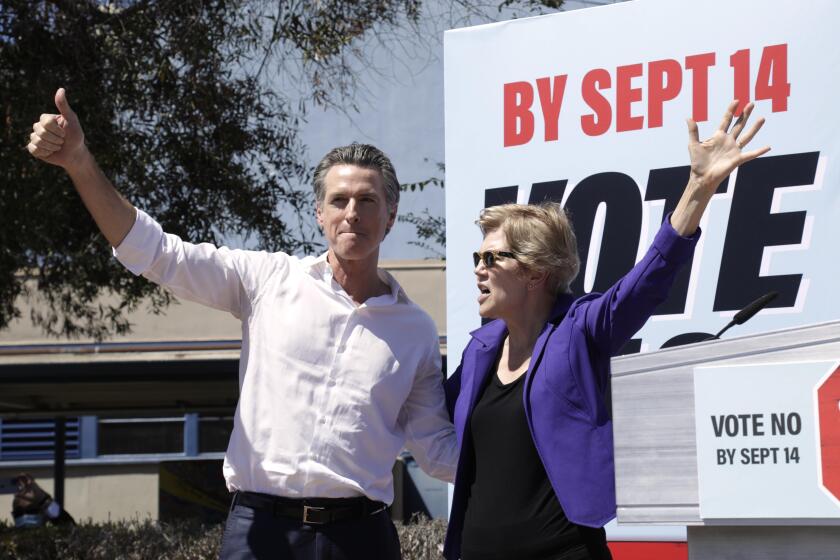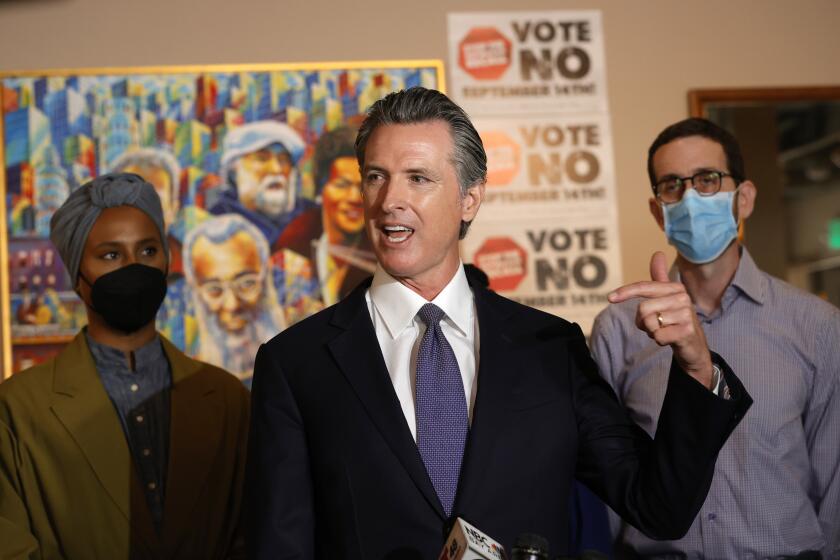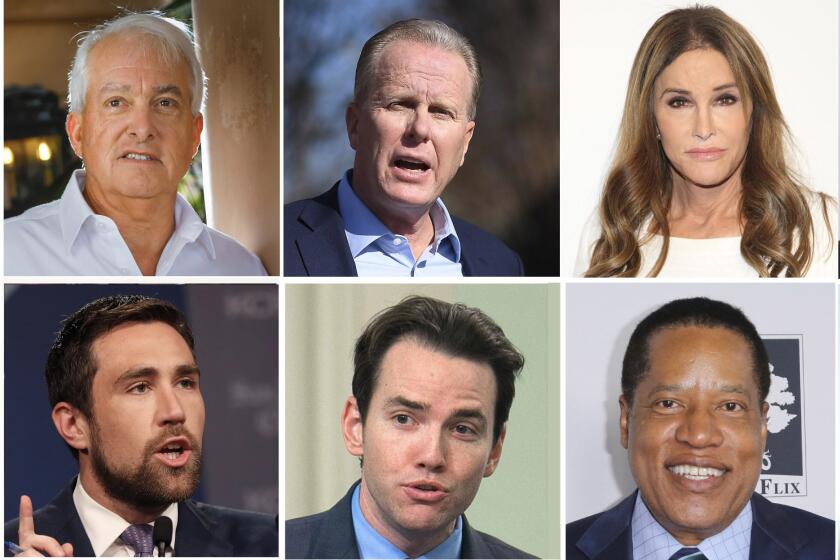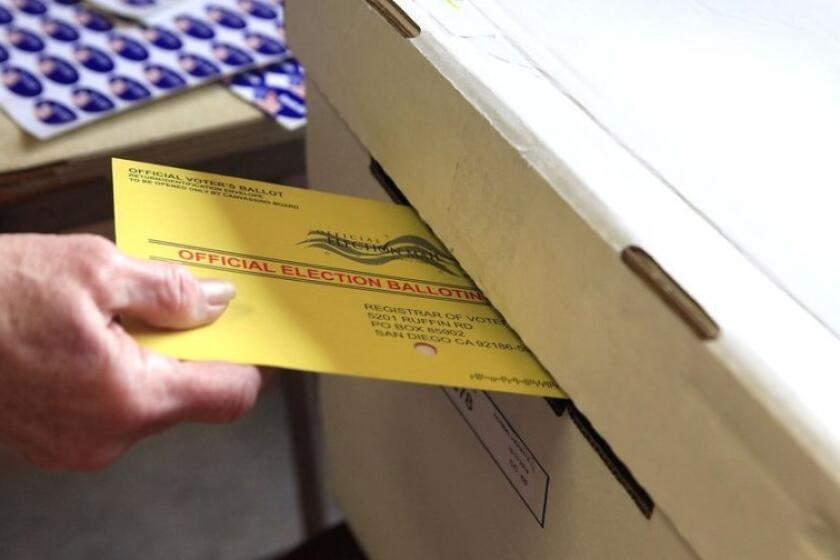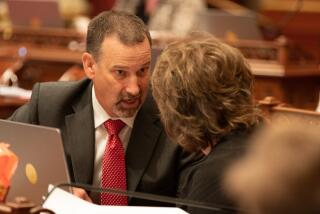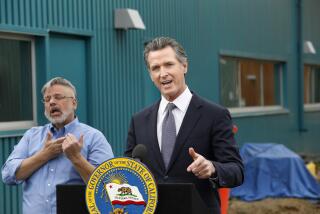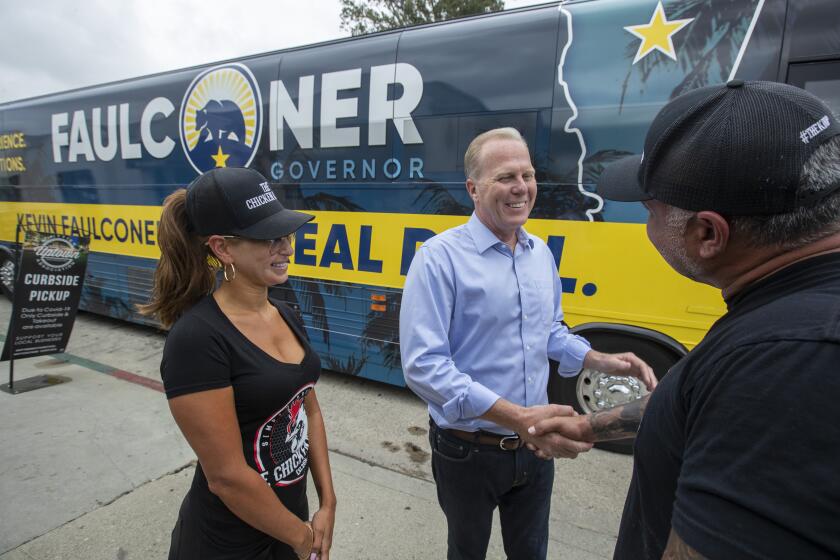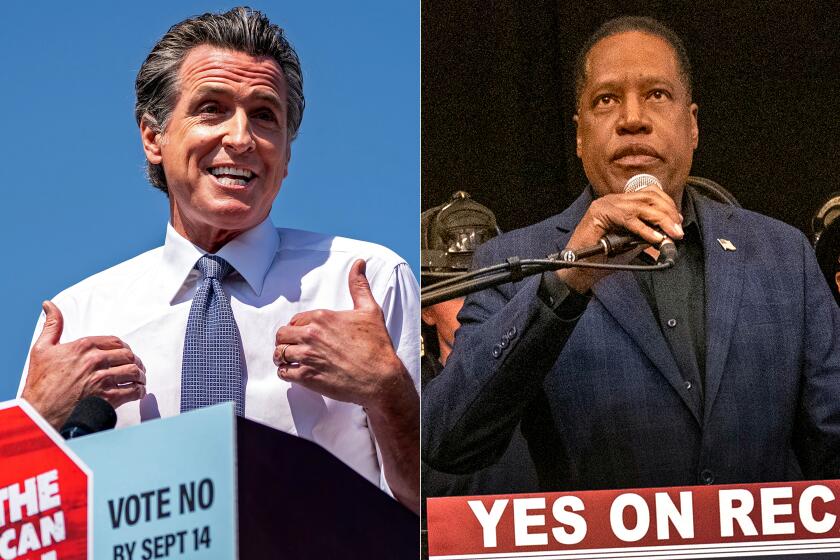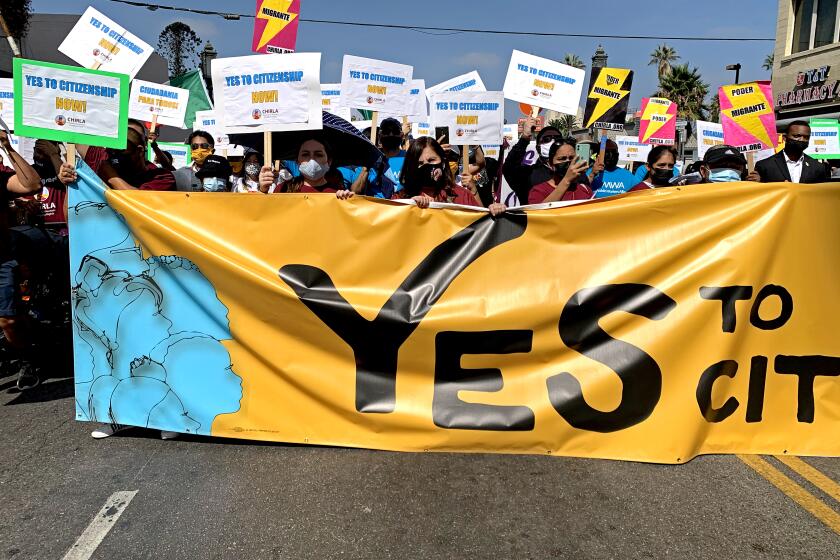Prayer and politicking: Churches become a center of the California recall campaign
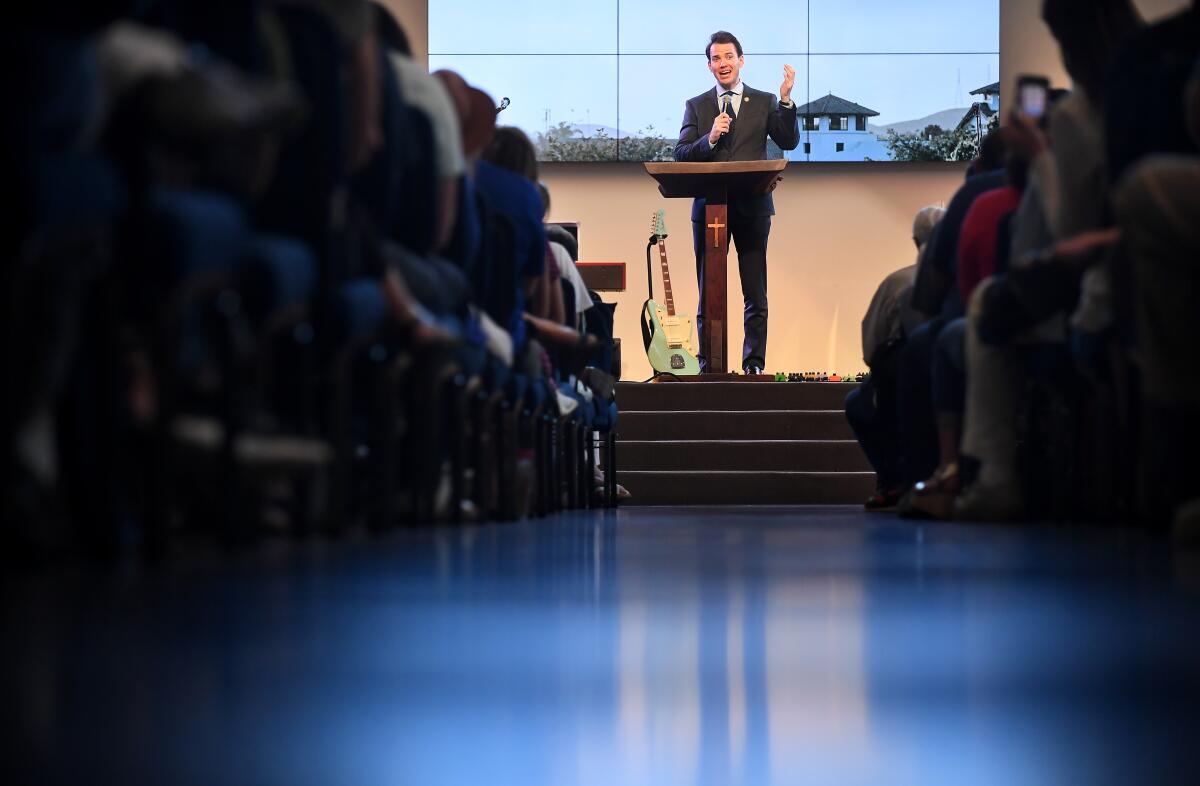
ROCKLIN, Calif. â It started as a traditional Sunday service.
The worship rose and fell in emotional chorus. People shook hands with their neighbors in the pews.
But then, in lieu of a sermon, Destiny Christian Church Pastor Greg Fairrington welcomed onstage Republican gubernatorial candidate Larry Elder.
âPeople of faith, in my opinion, have stood on the sidelines for far too long. We need to get involved. And that is why Iâm running,â Elder told the 5,000 people who packed the sprawling Rocklin church campus to watch his 30-minute conversations with the pastor at each of the three Sunday morning services. An additional 25,000 watched online. âIâm doing it because I feel that I have a patriotic, a moral, and a spiritual obligation to fix this state to the extent I can.â
More than 400 miles south, after another pastor prayed and a choir sang, a different Christian congregation was applauding the man Elder hopes to replace should he be recalled: Gov. Gavin Newsom.
âThe Bible teaches us we are many parts but one body. And when one part suffers, we all suffer. This notion of a web of mutuality â that weâre all in this together,â the governor said in a five-minute appearance at the Youngnak Church of LA Sunday morning.
As candidates crisscross California ahead of the recall election on Sept. 14, faith communities have become a central place for proselytizing to potential voters. The role of religion on the campaign trail has been amplified in recent weeks by lingering anger over Californiaâs COVID-19 restrictions that severely limited in-person worship as well as Elderâs rising candidacy, which has enjoyed significant support from Christian conservatives.
Of all the candidates, Elder has made arguably the most concerted effort to win over faith communities. In the nearly two months since he announced his run for governor â prodded by friend and devoted advocate Jack Hibbs, the pastor of Calvary Chapel Chino Hills â Elder has courted evangelicals at megachurches across the state.
He and other Republican candidates have seized on the closure of churches and religious organizations during the pandemic, harnessing anger over the shutdowns to generate enthusiasm for the recall among conservative voters.
An early contribution of $500,000 to the recall effort came from Orange County donor John Kruger through his limited liability company Prov 3:9, named for the Bible verse: âHonor the Lord with your wealth and with the firstfruits of all your produce.â A company representative said in January that Kruger believed Newsomâs executive actions restricting in-person religious assembly violated the U.S. Constitution.
Newsom teams up with prominent Democrats, as Republican front-runner Larry Elder held rallies in Castaic and Thousand Oaks.
âMany people of faith feel like the government has been overreaching and interfering with really the first freedom of our country, which is the right to gather and to worship and to practice your faith without any interference of any bureaucrat or any political authority,â said Assemblyman Kevin Kiley, a Republican recall candidate from Rocklin. âI think thatâs similar in some sense to how people have felt when it comes to the role of government in a lot of other ways.â
In February, the U.S. Supreme Court ruled that California could not ban indoor services during the pandemic. At Destiny, which held in-person services last year in defiance of the governorâs orders, Fairrington asked if Elder would ever use executive power to limit freedom of religion.
âOf course not,â Elder said to applause.
Newsom allies pay top dollar to hold the governorâs seat in deep blue California
He trumpeted other issues important to the conservative crowd, saying that he would never condemn people for âstanding up for their own religious valuesâ when refusing business to members of the LGBTQ community, that he doesnât think sex education should be taught in schools and that he believes Roe vs. Wade should be overturned, returning governing of abortion to states. The audience at each service cheered.
âI think the whole congregation was like ecstatic to receive somebody in thatâs such an opposition of what we have had these last four, eight, 10 years. Itâs incredible,â said Monica DâAngelo, 62, a newcomer to the church who attended the 8 a.m. service. âWe need to have a fresh start in this country and in this state especially.â
While Elder and Newsom were addressing congregations on Sunday, Kiley made his own appeal to church audiences in a string of campaign appearances at Godspeak Calvary Chapel Thousand Oaks, where Elder and Republican recall candidate Anthony Trimino previously campaigned. The church has a history of welcoming candidates to speak to parishioners, said pastor and former Thousand Oaks councilman Rob McCoy.
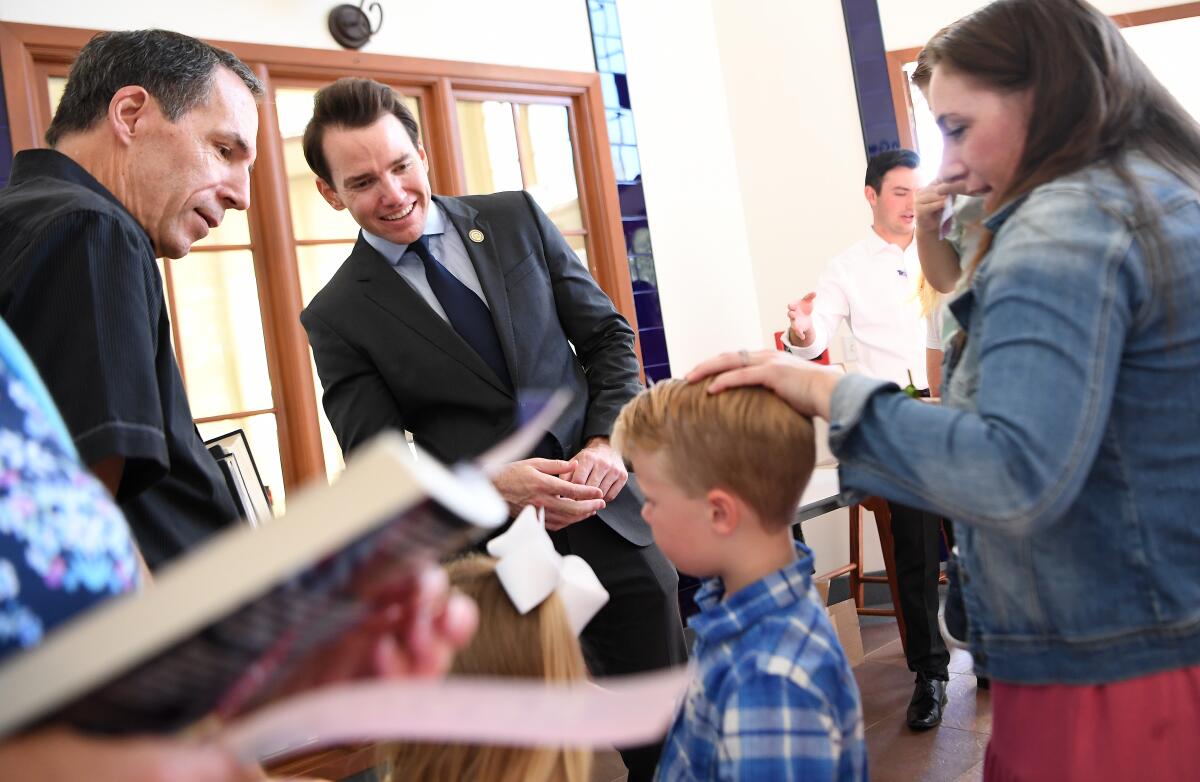
Kiley said campaigning in faith communities is a natural continuum of meeting with mosque, synagogue and church members in his district throughout his five-year tenure in the Assembly.
âFaith is something that is so fundamental to the lives of millions and millions of people in California. Churches are institutions that bring people together and also engage in service to the community,â Kiley said. âSo if youâre going to run for office and say, âIâm not going to interact with the faith community,â thatâs worth writing a story about, if someone said that.â
Among the other leading candidates running in the recall election, Republican businessman John Cox has campaigned in various faith settings, his campaign manager Bryan Reed said. A representative for Kevin Paffrath said the Democratic candidate had not visited or planned to campaign with any religious groups, though he is willing and âsupportive of all individual communities.â And in a campaign ad posted to her Twitter account in June, Republican recall candidate Caitlyn Jenner emphasized that, if sheâs elected, âTogether weâll send a message to Sacramento that the power belongs to the people and we only worship God.â
But not all places of worship are eager to jump into the political arena.
Republican recall candidate and former San Diego Mayor Kevin Faulconer planned to set up an appearance outside Christ First Covina church at an event last month. But about half an hour before Faulconer arrived, a church official told the organizers that Christ First could not host political events for fear of affecting its nonprofit status. The campaign moved next door to the sidewalk in front of Covina Public Library.
The Internal Revenue Service restricts certain political activities for 501(c)(3) nonprofits, including many faith organizations. To be considered a tax-exempt nonprofit, the IRS website states, an organization âmay not attempt to influence legislation as a substantial part of its activities and it may not participate in any campaign activity for or against political candidates.â
This is what voters need to know about the Sept. 14 recall election.
Campaigning has a long history inside houses of worship, but aside from the occasional example, the IRS rarely intervenes when religious institutions are alleged to overstep the bounds.
âYou kind of almost have to ask the question like, what are the things you can say that if they were recorded, and somehow the IRS engaged in an audit, and you took it to court, you are likely to lose,â UC Santa Barbara religious studies assistant professor Joseph Blankholm said. âThatâs kind of how we have to put it. Because weâre really that far down on the likelihood of enforceability.â
When asked by The Times if he contemplated whether his visit might jeopardize a churchâs nonprofit status, Kiley said, âI take it that thatâs something they have considered.â
âI donât really offer legal advice to anyone who offers me invitations to meet with them,â he added.
Recent research shows that politicking by congregations has increased in recent years, particularly among Black Protestant churchgoers. A majority of congregations in the U.S. engage in at least one politically related activity, including nonpartisan get-out-the-vote efforts and candidate endorsements, according to research by sociologists Kraig Beyerlein of the University of Notre Dame and Mark Chaves of Duke University citing the National Congregations Study.
âThe touchstone is if youâre engaging in partisan political activity,â said UCLA law professor Jonathan Zasloff. âUsually a church or synagogue isnât going to say â if there was a regular election â âSupport Newsomâ or âSupport the Republican.â The recall is a bit of a gray area, because itâs not necessarily partisan. In fact, Newsom himself isnât even listed as a Democrat. On the other hand, itâs pretty obvious what the partisan complexion is of this campaign, and many of the candidates have their own party affiliation listed.â
What you need to know about Californiaâs Sept. 14 recall election targeting Gov. Gavin Newsom.
IKAR Jewish community in Los Angeles has ramped up its activism since pledging to be a 100% voting community more than five years ago. Volunteers started phone banking to other members, congregants were sent home with âKnow your representativeâ cards and the synagogue advocated for ballot initiatives and legislation.
âOur synagogue was founded with a commitment to making doing justice a key pillar of what it means to us to be a faith community and to live Jewishly in the world,â said Brooke Wirtschafter, IKARâs director of community organizing, later adding that IKAR is âcareful and trying to make sure to stay within the boundaries of the law.â
Other faith leaders are happy to share whom they support.
After praying over a recent Elder rally in Costa Mesa, Father Brendan Hankins, a vicar at St. John the Baptist Catholic Church in Costa Mesa, told local blog Costa Mesa Brief: âWeâre pro life. We believe in the defense of life, from conception until natural death. And we know that with Larry Elder, that we have that support and that hope, and hopefully that will change the state.â
Diocese of Orange spokesman Bradley Zint later explained that Hankins, a priest of the Norbertine Order, had given âan expression of his own preference and not an endorsement coming from the Diocese.â
In a video posted to his personal Instagram account, San Diegoâs Awaken Church Pastor Jurgen Matthesius encouraged his 21,000 followers to vote Newsom out, explaining why he was voting for Elder.
âWeâre waiting for the perfect man, weâre waiting for the perfect candidate. They are moral, they are upright, they walk on water, they can multiply five loaves and two fish,â he said on the video. âWe have to dislodge wickedness, and we have to develop not a savior mentality, but we have to develop a long-game mentality.â
On Sunday, Fairrington introduced Elder with a Bible verse, Proverbs 29:2: âWhen the righteous are in authority, the people rejoice: but when the wicked beareth rule, the people mourn.â
âWeâve been groaning in the state of California for a while right now, because we have not been governed by a moral governor,â he told the church. âA Christian is involved in civics. A lot of people say, âseparation of church and state.â You donât know your history. We have a responsibility to make our voices heard.â
He prompted his congregants: âYou know what to do on Sept. 14. Thereâs two questions. No. 1, do you want to recall Gov. Newsom, yes or no. And the answer is?â
Before he finished the question, the crowd drowned out his voice with their raucous answer: âYes!â
âYou said it, I didnât,â the pastor said. (Three weeks earlier, Fairrington told his congregation: âDo your job as Christians on Sept. 14 and vote yes on recalling an immoral governor!â)
Even if they donât explicitly tell congregants how to vote, faith institutions can hold enormous sway with how leaders speak about political issues, Blankholm said.
âI think itâs important that we recognize how substantive is the difference between someone saying, âVote for Gavin Newsom,â or âVote against the recall of Gavin Newsom,â or âVote for the recall of Gavin Newsomâ and someone saying everything but that,â Blankholm said. âWe obviously live in an era of incredibly complex political speech.â
More to Read
Sign up for Essential California
The most important California stories and recommendations in your inbox every morning.
You may occasionally receive promotional content from the Los Angeles Times.
